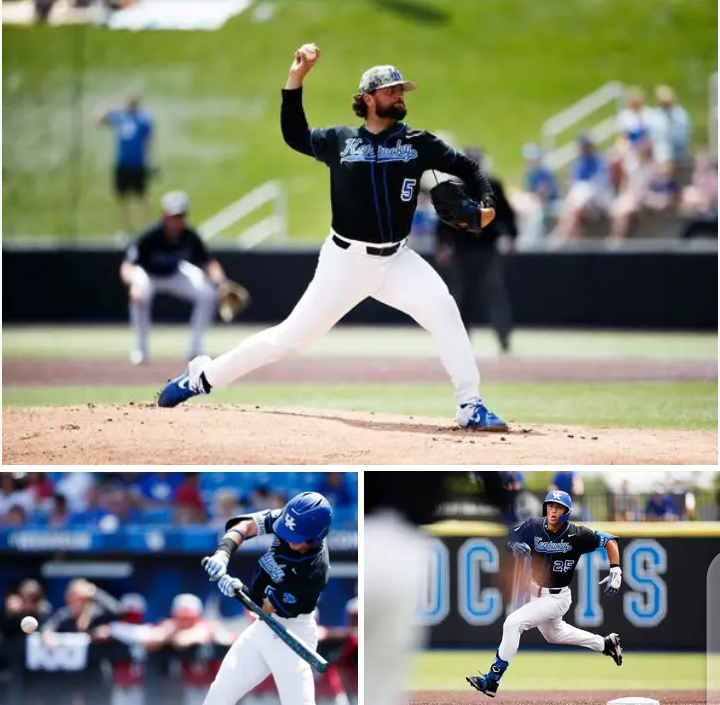Bluegrass and Baseball
The sun hung low over Lexington, throwing long shadows across the freshly chalked diamond of Kentucky Proud Park. A warm breeze rustled the American flags above the outfield stands, and the smell of grilled bratwursts and buttered popcorn drifted lazily through the air. It was Saturday, and for the town, that meant one thing: Wildcats baseball.
Harper Langston adjusted his cap, the navy “K” embroidered in old-school stitching pressed proudly against his sweat-matted hair. A junior pitcher for the University of Kentucky, he’d been waiting all week for this game—Arkansas, ranked No. 5, was in town, and the stands were packed. Over 4,000 strong. Families, students, old alums in worn-out jerseys, and little leaguers with permanent marker autographs on their gloves. It was more than a game—it was community stitched into nine innings.
From the mound, Harper squinted toward the plate. Bottom of the sixth, two outs, runners on first and third. The score: tied 3–3. Tension radiated like heat waves off the turf. He gripped the seams of the baseball, feeling the familiar comfort in the leather’s grain, the kind passed down through generations. His grandfather used to pitch for the Bluegrass Barnstormers, a semi-pro team that traveled the backroads of Kentucky playing under oil-lamp lights.
He wound up and threw.
CRACK!
The sound echoed like a gunshot through the stadium. The batter connected, and the crowd collectively gasped. But it wasn’t deep. Center fielder Mikey Torres sprinted back, cleats tearing up the grass like a combine through corn. At the warning track, he leapt.
Time slowed. The ball, white against the blue Kentucky sky, arced downward. Mikey’s glove stretched wide—then snapped shut.
Silence cracked into thunderous applause.
Harper pumped his fist. The dugout erupted. Coach Jenkins slapped his clipboard against the rail. Even the old guy with the hand-painted “CATS WIN” sign danced a little two-step on the bleachers. It wasn’t the final out, but it felt like a turning point, the kind that makes local legends.
After the inning, Harper sat on the bench, towel draped over his shoulder, heart pounding. Coach leaned over, eyes serious.
“You gave ‘em something to believe in,” he said. “You gave Kentucky a story.”
Later that night, after the Cats won 5–3, the team lingered on the field. Kids ran the bases. Parents took photos under the stadium lights. Harper looked up at the stands—rowdy, joyful, alive. Baseball in Kentucky wasn’t just a sport. It was fireflies after supper, dirt on your jeans, and the low hum of cicadas over cheers. It was bourbon-soaked stories and voices echoing in the hollers. It was home.
As he walked off the field, someone handed him a pen and a program. A young boy, front teeth missing, held out his glove.
“Mr. Langston, will you sign this?”
Harper smiled and signed, slowly and carefully. He wasn’t just playing ball. He was becoming a part of something bigger. A tradition.
Would you like a photo or illustration to accompany this story?
















